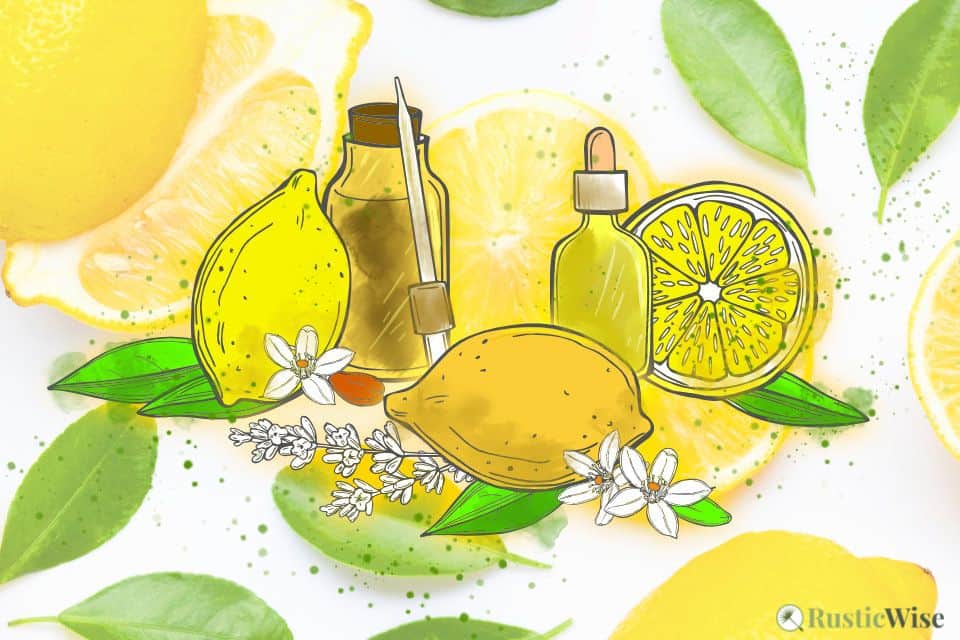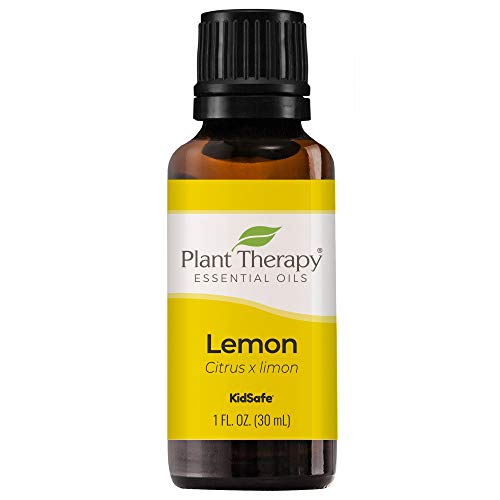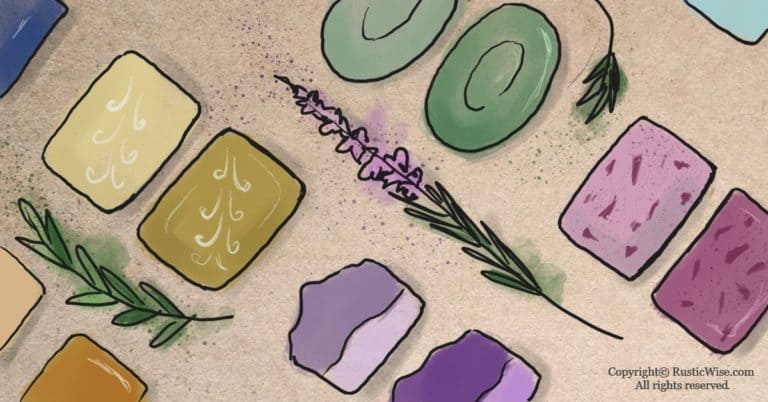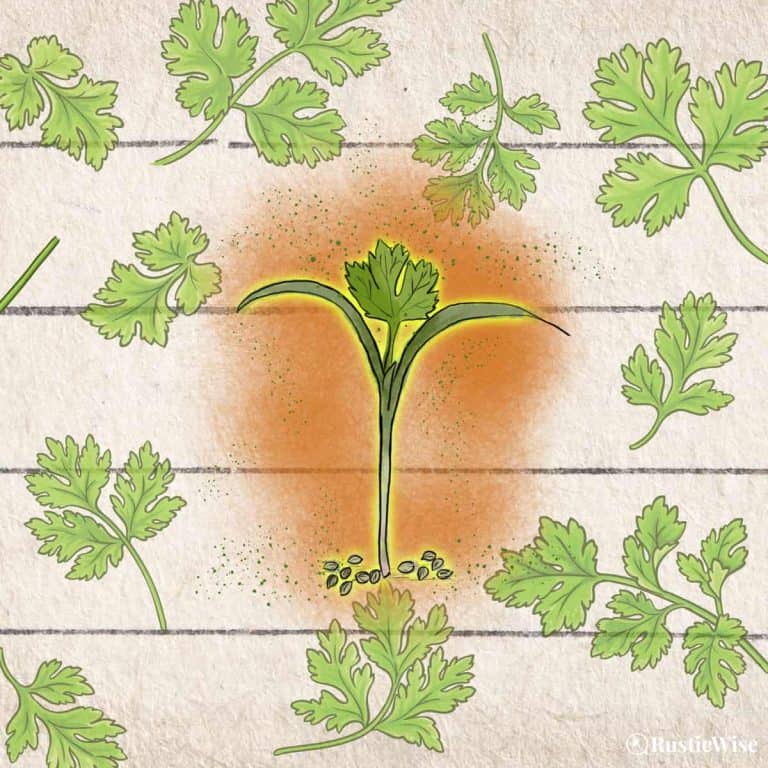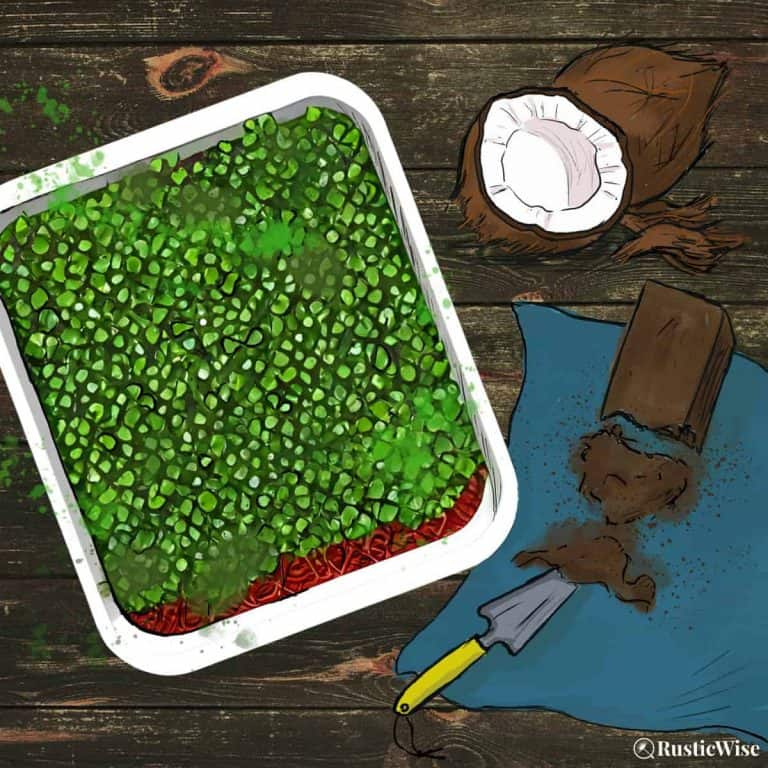6 Uplifting Lemon Essential Oil Benefits for Skin + Wellness
RusticWise is supported by its readers. When you purchase through links on our site, we may earn an affiliate commission. As an Amazon Associate, we earn from qualifying purchases. Thank You!
Many of us use lemon in our daily lives: add a wedge of lemon to a glass of water for a refreshing citrus splash; use lemon to clean and deodorize; or drizzle lemon juice atop a savory dish.
Let’s not forget that lemon peels contain many beneficial compounds that can promote a healthy complexion. We’ve rounded up six lemon essential oil benefits for skin. Lemon essential oil (citrus limon) derives from the fruit peel and is packed with antioxidants to promote overall healthy skin, plus antimicrobial properties that may benefit acne and other skin conditions.
Besides its benefits for skin, the scent of lemon has uplifting and energizing properties! We’ll take a look at how this popular citrus EO benefits your skin (especially those with oily skin!), plus safety tips on using it properly.
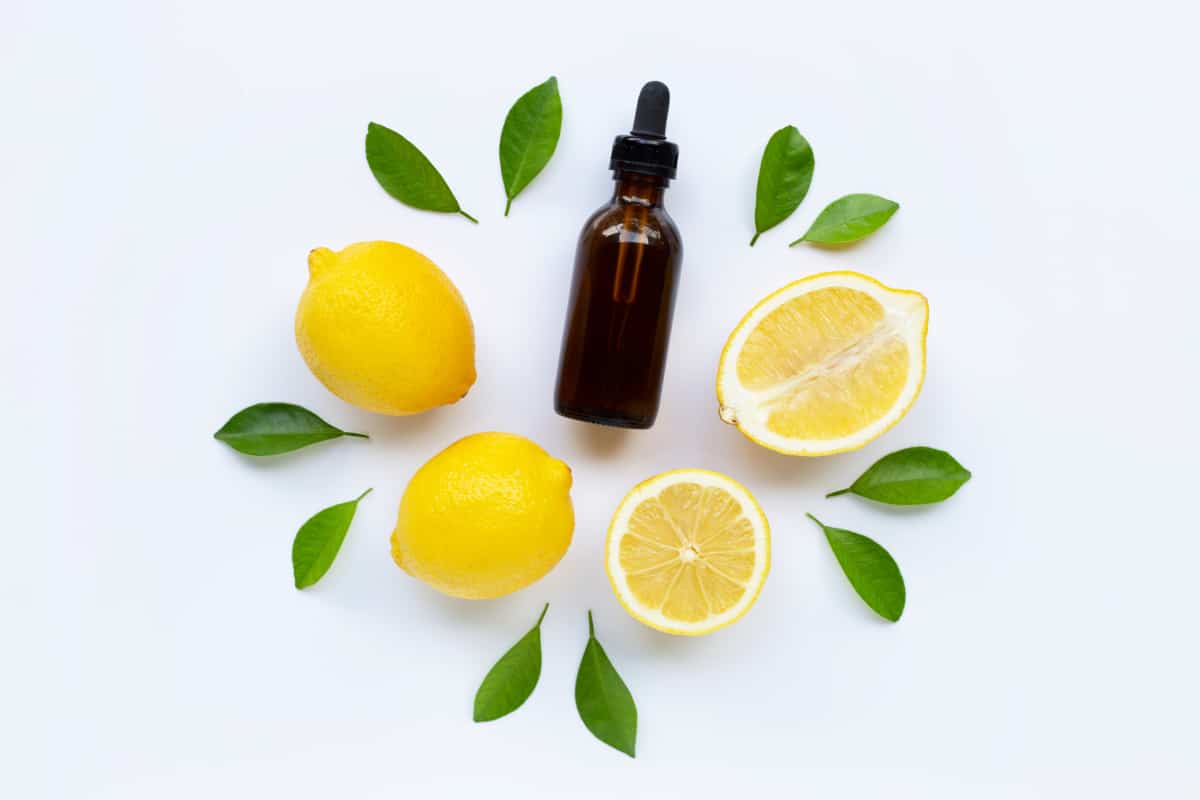
A closer look at lemon essential oil
Sweet and slightly herbaceous, lemon is one of the most popular citrus essential oils. It serves as a strong top note. It has a yellow-green color and blends well with other citrus fruits, including lime essential oil, sweet orange essential oil, and other light herbal or floral notes.
Citrus essential oils are extracted either via cold pressing or steam distillation. (Many people prefer cold pressed oils as they believe more of the delicate compounds are left intact.)
Lemon trees, small evergreen trees or shrubs are found in most tropical and subtropical regions around the world today, including southern Europe, coastal regions of the U.S., Mexico, Argentina, and Brazil. In particular, lemon production is big in California and Sicily.¹
The main constituents in lemon EO are:²
- Limonene (which makes up the bulk)
- γ-terpinene
- β-pinene
Don’t confuse lemon fruit peel (Citrus limon) with these other essential oils with “lemon” in their common name:
- Lemon leaf oil (Citrus limon): Derives from the same lemon tree, but from the leaves rather than the fruit peel.
- Lemon balm (Melissa officinalis): A herb from the mint family.
- Lemongrass (Cymbopogon flexuosus): A tall perennial grass.
- Lemon eucalyptus (Corymbia citriodora): A lemon-scented eucalyptus tree.
How to use lemon essential oil safely
You may have heard that citrus EOs are phototoxic, with some oils being more phototoxic than others. Lemon peel oil is considered moderately phototoxic.
Keep in mind that if you blend lemon with other more phototoxic citrus EOs such as bergamot or lime, you increase the level of phototoxicity.
Some people have experienced adverse skin reactions ranging from mild to severe after using citrus oils and going outdoors on a sunny day without proper skin protection.
- Talk to your doctor first: The U.S. Food and Drug Administration (FDA) does not regulate essential oils. You may find the quality of EOs to be of varying levels. Pregnant women (or breastfeeding women) should speak to a doctor before using any EOs.
- Avoid using on young children: Keep your EOs safely out of reach of children and avoid using on children under 5 years of age.
- Do a patch test: If you have sensitive skin and are prone to allergic reactions, it’s a good idea to do a quick 24 hour patch test to check for signs of redness or skin irritation. (Dilute it before applying!)
- Dilute it first: Never apply undiluted essential oils directly onto skin. Essential oils are very potent and can lead to skin irritation if applied undiluted. A few good carrier oils include coconut oil, sweet almond oil, jojoba oil, olive oil, and sunflower oil.
- Protect your skin: After applying lemon oil onto skin, your skin is more sensitive to UV rays. Protect your skin from burns, redness, or irritation by avoiding sun exposure for 24 hours after using lemon oil in leave-on products such as creams or lotions. (When you add lemon EO to products that are washed off such as soap, it doesn’t pose the same problem.)
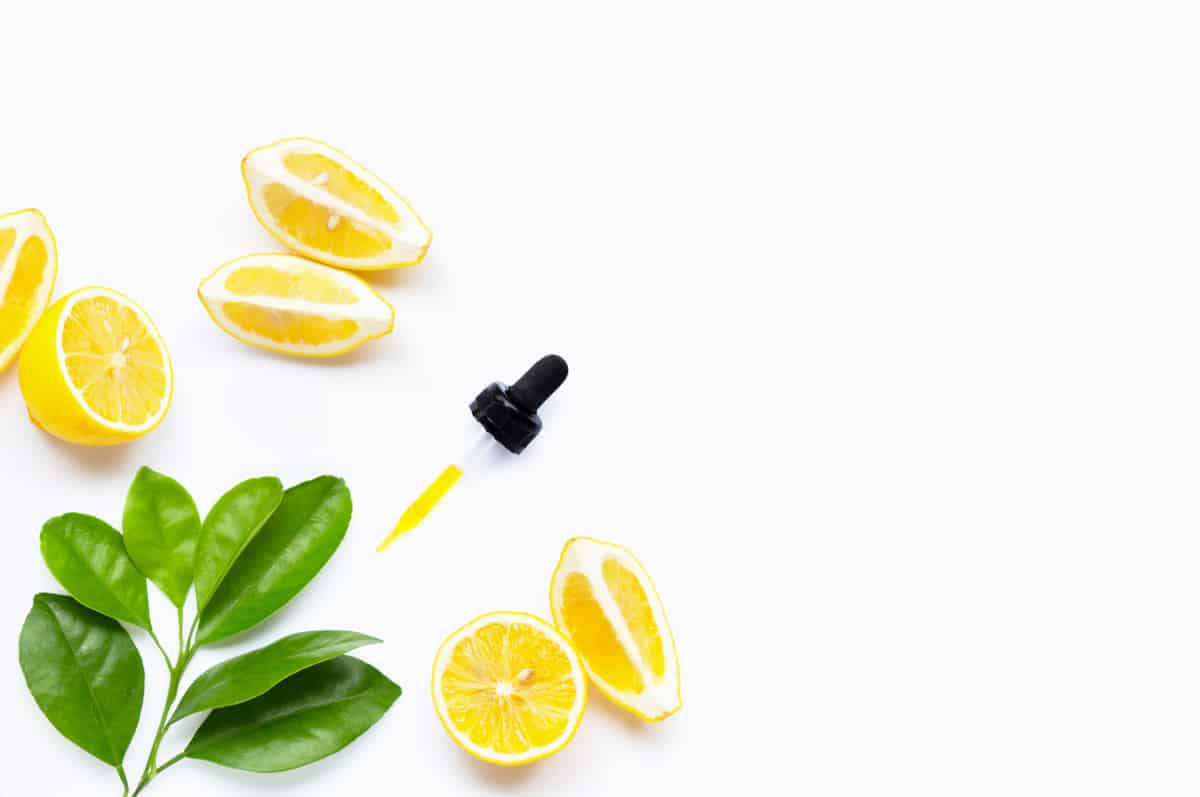
6 lemon essential oil benefits for skin
Ready to reap the benefits of lemon essential oil benefits for skin? Let’s take a closer look at this powerful antioxidant.
1. High in antioxidants and anti-inflammatory properties
The vitamins and antioxidants present in lemon peel help ward off free radicals, which contribute to signs of premature aging, such as wrinkles.
Free radicals cause oxidative stress on skin cells. Antioxidants work to protect the surface of the skin from oxidative damage caused by free radicals and factors that contribute to aging (such as UV rays and environmental pollution).
Antioxidants in skin care work to promote a healthy looking complexion—skin tone appears brighter and more youthful.
Several studies show citrus limon’s antioxidant and anti-inflammatory properties.
A 1999 study examines the effectiveness of natural compounds derived from lemon oil extract on managing free radicals and tissue damage in skin. The tests performed in vitro and in vivo show a compound they named Lem1 exhibits powerful antioxidant abilities and may help with antiaging of skin.³
A 2017 animal study shows that the main constituent found in lemon oil, D-limonene, exhibits activity that significantly boosted antioxidant levels and lowered inflammation in rats with ulcerative colitis (an inflammatory bowel disease).⁴
Skin inflammation (redness or swelling) is common and can occur for a variety of reasons. Sun damage, an adverse reaction to a product, or even skin conditions like eczema or rosacea can contribute to skin inflammation.
A 2016 study examines the properties of several citrus EOs to look at their individual phytochemical makeup and their anti-inflammatory properties on mice. They found that oil from citrus limon showed significant antioxidant capabilities, likely because of high levels of limonene.⁵
2. Antibacterial, antifungal, and antiviral properties
The key to maintaining a healthy complexion and preventing skin issues is to keep harmful bacteria (and other pathogens) at bay.
Luckily, lemon delivers all the above.
In developing countries around the world (and increasingly so in the U.S. and the U.K.), essential oils are used as a natural alternative medicine to combat a variety of fungal skin infections, and for other dermatology purposes.
There are many practical lemon essential oil benefits for skin. In particular, lemon peel oil is used to treat the following:⁶
- Abscesses
- Acne
- Athlete’s foot
- Blisters and boils
- Appearance of cellulite
- Cuts and wounds
- Insect bites
- Mouth ulcers
- Rosacea
- Viral infections (cold sores, herpes, warts)
Lemon essential oil (along with eucalyptus, lavender, peppermint, sage, santolina, and tea tree oils) have showed antiviral activity.⁶
Lemon has also demonstrated antimicrobial properties against E. coli.⁶
Staphylococcus aureus is a common bacterium that can cause many skin infections. It’s often found in acne and burn wounds. Lemon EO has shown antibacterial activity against this strain of bacteria.⁶
And, lemon EO helps keep fungal yeast infections at bay. Lemon has proven antifungal properties against a common pathogen, Candida albicans.
You might like
Lemon Essential Oil 30 mL (1 oz) 100% Pure, Therapeutic Grade
- 100% pure & cold pressed lemon oil: Extracted from real lemon peel. No fillers or additives were diluted to extend its quantity.
- Energizing & uplifting scent: This citrus fragrance helps support your immune system, while boosting energy and improving mental focus.
Found on Amazon
Check Current Price
Those in Canada and the UK should be taken to the product listing in your region.
3. Astringent properties help with oily skin and acne
While this citrus EO is suitable for most people, those with oily skin types may especially benefit from its astringent properties.
Astringents help to cleanse the skin and remove dead skin cells, as well as minimize the appearance of pores. Lemon contains special compounds which help to reduce excess oil (sebum).
Lemon’s antibacterial properties mentioned above also help to keep acne in check. The anti-inflammatory properties in limonene may help improve redness or swelling in the skin.
Those with dry skin may also benefit from the restorative properties of lemon EO when used as part of a daily beauty regime.
The result is a more healthy, radiant complexion.
4. May promote wound healing
Lemon’s antiseptic qualities may promote faster healing in skin cuts and wounds.
When the skin is damaged from friction, cuts, or wounds, it can become infected and sore. Lemon essential oil may be a fantastic alternative to other over-the-counter and prescription medications for minor cuts and scrapes. Antiseptic and astringent properties can help prevent infection, reduce inflammation, and promote faster healing.
When using lemon essential oil, remember to dilute the oil with a carrier oil first before applying to skin.
A 2016 animal study demonstrates citrus limon oil’s ability to speed up healing time both in vivo and in vitro. Infected rabbits treated with a solution of 20 percent lemon oil showed complete recovery during a two-week treatment.⁷
Other benefits of lemon essential oil
Besides its many skin nourishing qualities, lemon EO also offers other wellness benefits.
5. Uplifting properties
In need of a natural pick-me-up? Lemon EO is a great mood-booster. Known as an uplifting scent, lemon contains plenty of feel-good terpenes, limonene and β pinene.
Simply inhaling this bright citrus oil through an aromatherapy diffuser can prove energizing. The smell of lemons can serve as a mood enhancer by releasing feel-good chemicals in the brain.
6. Aromatherapy may minimize pain
Lemon’s invigorating aroma may help minimize pain.
A 2014 study looked at effects of lemon fragrance on mice and their ability to regulate pain. Researchers found that simply by inhaling lemon oil, the mice’s anterior cingulate cortex (ACC) was kickstarted which supports lemon’s analgesic effects. The mice’s perception of pain was changed.⁸
Fragrances that pair well with lemon
If you’re looking for inspiration to make your own essential oil blends, lemon is a fairly versatile scent that works well with other citrus oils, herbaceous notes, or light florals.
Tip: A powerful and pleasing combo is lemon paired with lavender. In a study, lemon and lavender, when combined, showed effectiveness against skin pathogens including C. albicans, S. aureus, and P. aeruginosa.⁶
Try the following essential oil blends with lemon:
- Bergamot
- Eucalyptus
- Frankincense
- Lavender
- Lemongrass
- Lime
- Orange (or mandarin)
- Peppermint
- Rosemary
- Ylang Ylang
How to use lemon essential oil
Now that we know the multitude of benefits lemon offers, let’s look at how to use it safely. Remember to dilute essential oils before using for topical applications.
Tip: A general guideline when using an essential oil is to dilute it before applying topically. Use 4 drops of lemon EO per ounce (30 milliliters) of a skin-safe carrier oil.
1. Aromatherapy
One of the easiest ways to reap the benefits of this uplifting citrus scent is to use it for aromatherapy.
Add a few drops to an oil diffuser and enjoy the energizing citrus aroma. Use lemon EO whenever you need to boost spirits, or re-energize before you tackle the day.
Don’t have an oil diffuser? No worries.
You can still use the “dry infusion” method by adding a few drops of oil onto a cotton ball and keeping it nearby you on a desk or tabletop.
Relax, and let the scent of lemon ease negative emotions and nervous tension.
2. Skin + acne treatment
A great way to get the most of lemon essential oil benefits for skin is to make your own DIY skin treatment. Make use of lemon’s antibacterial and astringent properties to cleanse and soothe problem areas on skin.
Use a diluted amount of lemon EO with a non-comedogenic carrier oil. Apply to problem areas with a cotton ball.
3. Skin lotion
Nourish and hydrate the skin by combining the benefits of coconut oil and lemon together in one simple moisturizer for skin.
Add 10 to 15 drops of citrus limon to roughly 1/2 cup of coconut oil. Massage all over the body for a soothing and nourishing moisturizer.
You can also add a few drops to a body lotion or a facial cleanser (avoid getting in your eyes!).
4. Add to homemade soap
Add a citrus splash to your next batch of soap.
Depending on your soap recipe, try adding around 0.5 ounces of lemon essential oil per pound of soap.
To make the scent of lemon last longer in cold process soap, try creating a blend with other citrus oils.
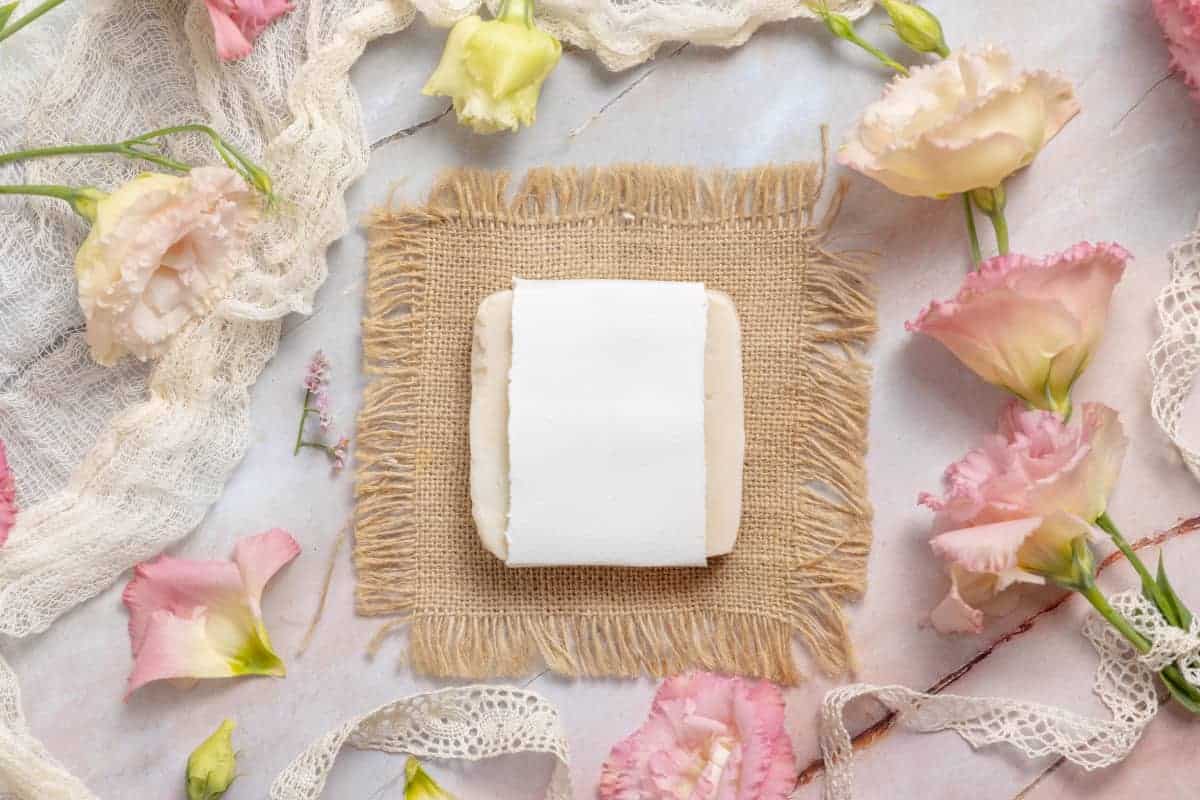
5. Create a multipurpose household cleaner
The antiseptic qualities combined with it’s cleansing citrus scent make lemon EO a no-brainer when making your own DIY natural household cleaner.
You’ll need:
- Spray bottle
- 6 cups of water
- ¼ cup of liquid Castile soap
- 5-10 drops of citrus limon
Combine all ingredients in a clean spray bottle and mix well. Shake well before each use.
6. Invigorating citrus bath
Combine aromatherapy together with a soak in the tub! Use this enlivening scent when you need to recharge your batteries.
Note that essential oils do NOT mix well with water. It’s important to use a dispersant such as milk before adding to water. If you simply place a few drops of EO directly into bath water, it may irritate skin.
Add a few drops of EO together with a dispersant (2–4 tablespoons) such as creamy milk or goat’s milk before adding to water.
Enjoy your citrus bath!
How to extend the shelf life of your citrus oils
While many essential oils have a shelf life of 2 or 3 years (some up to 8 years), citrus oils such as lemon have a shorter shelf life. This is due to the high limonene content which is prone to oxidation.
So how do you keep that bottle of lemon EO lasting longer? Stick it in the fridge, according to the Robert Tisserand Institute. Keeping them cool slows the oxidation rate. You can keep them for up to 2 years in this way.⁹
New to making soap? 🧼❓
👉We have a fantastic overview on the whole soapmaking process here: read our Timeless Guide To Soapmaking.
If you would like to see our soapmaking posts organized by topic type, see our Soapmaking Collection.

References
- Britannica, Lemon, https://www.britannica.com/plant/lemon. Accessed April 2022.
- A. M. Ayedoun, P. V. Sossou, Marek Mardarowicz & Piet A. Leclercq (1996). Volatile Constituents of the Peel and Leaf Oils of Citrus limon L. Burm. f. from Benin, Journal of Essential Oil Research, 8:4, 441-444, DOI: 10.1080/10412905.1996.9700661
- Calabrese, V., Randazzo, S. D., Catalano, C., & Rizza, V. (1999). Biochemical studies on a novel antioxidant from lemon oil and its biotechnological application in cosmetic dermatology. Drugs under experimental and clinical research, 25(5), 219–225.
- Yu, L., Yan, J., & Sun, Z. (2017). D-limonene exhibits anti-inflammatory and antioxidant properties in an ulcerative colitis rat model via regulation of iNOS, COX-2, PGE2 and ERK signaling pathways. Molecular medicine reports, 15(4), 2339–2346. https://doi.org/10.3892/mmr.2017.6241
- Amorim, J. L., Simas, D. L., Pinheiro, M. M., Moreno, D. S., Alviano, C. S., da Silva, A. J., & Fernandes, P. D. (2016). Anti-Inflammatory Properties and Chemical Characterization of the Essential Oils of Four Citrus Species. PloS one, 11(4), e0153643. https://doi.org/10.1371/journal.pone.0153643
- Orchard, A., & van Vuuren, S. (2017). Commercial Essential Oils as Potential Antimicrobials to Treat Skin Diseases. Evidence-based complementary and alternative medicine : eCAM, 2017, 4517971. https://doi.org/10.1155/2017/4517971
- Aboelhadid, S. M., Mahrous, L. N., Hashem, S. A., Abdel-Kafy, E. M., & Miller, R. J. (2016). In vitro and in vivo effect of Citrus limon essential oil against sarcoptic mange in rabbits. Parasitology research, 115(8), 3013–3020. https://doi.org/10.1007/s00436-016-5056-8
- Ikeda, H., Takasu, S., & Murase, K. (2014). Contribution of anterior cingulate cortex and descending pain inhibitory system to analgesic effect of lemon odor in mice. Molecular pain, 10, 14. https://doi.org/10.1186/1744-8069-10-14
- Robert Tisserand Institute, Lemon on the rocks: keep your essential oils cool, https://roberttisserand.com/2013/07/lemon-on-the-rockskeep-your-essential-oils-cool/. Accessed April 2022.

Author: Theresa Tesolin
Theresa is co-founder of RusticWise. She helps people unleash their inner DIY spirit by encouraging them to get dirty and make or grow something from scratch.

